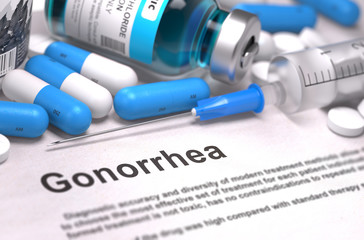
Syphilis is a sexually transmitted infection caused by the bacteria Treponema pallidum. It is a highly contagious disease that spreads as a result of direct contact with a syphilis sore during vaginal, anal, or oral sex. Syphilis was once regarded as a major public health threat because of its ability to inflict serious long-term health challenges such as arthritis. If left untreated the disease can cause serious health problems. The development of Syphilis occurs in four stages namely; primary, secondary, latent, and tertiary stages. Each stage of the disease comes with its own distinct symptoms. Also Read: Can You Get Syphilis From Kissing?
The Stages of Syphilis
Syphilis infection progresses through various stages if left untreated. Understanding the different stages is crucial for early detection and appropriate treatment. Here are the stages of syphilis:
- Primary Stage of Syphilis: The primary stage of syphilis typically begins with the appearance of single or multiple sores, known as chancres, at the site where the syphilis bacteria entered the body. These sores can be found on the genitals, rectum, or anal openings. The chancres are usually firm, round, and painless, which often makes them go unnoticed. They may heal on their own after 3 to 6 weeks, even without treatment. However, the infection remains in the body and can progress to the next stage if left untreated.
- Secondary Stage of Syphilis: The secondary stage of syphilis occurs within a few weeks to months after the primary stage. During this stage, a person may develop a reddish or brownish rash on the palms, hands, feet, arms, or other areas of the body. Swelling of the lymph glands may also occur. Additional symptoms can include fever, sore throat, headaches, hair loss, weight loss, pain, and muscle aches. These symptoms may come and go, and they can be mistaken for other illnesses. If left untreated, syphilis can advance to the next stage.
- Latent Stage of Syphilis: The latent stage of syphilis is characterized by a lack of noticeable symptoms, but the infection remains present in the body. This stage can last for several months to even 50 years. During this period, the person may not experience any symptoms, and the ability to infect others is reduced. However, pregnant women may still transmit the infection to their unborn child, leading to congenital syphilis.
- Tertiary Stage of Syphilis: Tertiary syphilis occurs in about 15 to 20 percent of cases that have gone untreated for many years. It is the most severe and potentially life-threatening stage. Tertiary syphilis can cause serious damage to various organs and systems in the body. It can lead to complications such as cardiovascular problems, neurosyphilis (affecting the nervous system), gummatous syphilis (causing destructive skin lesions and soft tissue damage), and even neurologic and psychiatric disorders. Some of the devastating consequences of tertiary syphilis include paralysis, permanent ulcers, insanity, and blindness.
Risk Factors for Syphilis
Several factors increase the risk of contracting syphilis. Individuals should consider getting tested for syphilis if they:
- Are sexually active, especially with multiple partners.
- Have engaged in homosexual or lesbian relationships, as the risk of transmission exists regardless of sexual orientation.
- Are pregnant; screening for syphilis is a routine part of prenatal care to prevent transmission to the unborn child.
- Have a partner who has tested positive for syphilis, as it can easily spread through sexual contact.
- Have tested positive for HIV or engage in sexual activity with HIV-positive individuals, as HIV-positive individuals may have weakened immune systems and are at higher risk of contracting other infections, including syphilis.
Regular testing, practicing safe sex, and open communication with sexual partners are essential steps in preventing the spread of syphilis and other sexually transmitted infections. If you suspect you may have been exposed to syphilis or notice any symptoms related to the infection, seeking medical attention promptly is crucial for proper diagnosis and treatment. Early detection and treatment of syphilis can prevent the disease from progressing to its more severe stages and avoid complications.
Treatment
Syphilis is a treatable infection, and early diagnosis and treatment are essential to prevent its progression and potential complications. The choice of treatment and duration depends on the stage of syphilis and the individual’s overall health. The primary and secondary stages of syphilis are usually treated with antibiotics, mainly penicillin or other appropriate alternatives for those allergic to penicillin. The latent and tertiary stages may require a longer course of treatment.
Here is an overview of the treatment for different stages of syphilis:
- Primary and Secondary Syphilis: The standard treatment for primary and secondary syphilis is a single dose of penicillin. Depending on the specific situation, the healthcare provider may recommend either intramuscular injection or intravenous administration of the medication. For those allergic to penicillin, alternative antibiotics such as doxycycline, tetracycline, or azithromycin can be used.
- Latent Syphilis: Latent syphilis, where the infection is present but without noticeable symptoms, can be treated with a series of penicillin injections or oral antibiotics. The treatment duration may vary depending on the stage of latent syphilis (early or late) and the individual’s medical history.
- Tertiary Syphilis: Treatment for tertiary syphilis is more complex and may require longer courses of antibiotics, often involving intravenous penicillin for an extended period. Depending on the extent of organ damage or complications, other specialized treatments may be necessary to manage specific health issues resulting from the late-stage infection.
- Neurosyphilis: Neurosyphilis, which affects the nervous system, requires intensive treatment with high-dose intravenous penicillin for an extended period. This treatment is crucial to prevent further neurological damage and complications.
It is essential to complete the full course of antibiotics as prescribed by the healthcare provider to ensure that the infection is adequately treated and to reduce the risk of developing antibiotic-resistant strains of syphilis.
After treatment, regular follow-up visits and repeat blood tests are necessary to ensure that the infection has been successfully cleared. It’s crucial to abstain from sexual activity during the treatment period and until the healthcare provider confirms that the infection is no longer transmissible.
It’s also important to notify all sexual partners about the syphilis diagnosis so that they can get tested and receive treatment if necessary. This practice, known as partner notification or contact tracing, helps prevent further transmission of the infection.
Pregnant women with syphilis must receive immediate treatment to prevent transmitting the infection to their unborn child. Adequate and timely treatment can significantly reduce the risk of congenital syphilis and its associated complications.
Overall, seeking prompt medical attention, adhering to the prescribed treatment plan, and practicing safe sex are crucial steps in managing and preventing the spread of syphilis. Regular testing for sexually transmitted infections, including syphilis, is essential for sexually active individuals to ensure early detection and treatment if needed.
Copyright ©
Permission is hereby granted for the use of whole or parts of this article provided appropriate credit is given to www.publichealth.com.ng
Public Health Nigeria an Interdisciplinary public health movement focused on health education, advancing fair public health policies, promoting fitness, healthy diets, responsible behavior, community health and general well-being.





How can it be treated? Have use different types of antibiotics, when ever I go for test he still show heavy growth of staf. Pls I want u to help prescribed good drugs that can take care of it permanently. Thank you
Thank you for your question , the first thing for you to do is to see a qualified medical personnel who will request for specific tests to be carried out in order to determine what type of STD is involved before prescribing any medication
Thank you for your question , the first thing for you to do is to see a qualified medical personnel who will request for specific tests to be carried out in order to determine what type of STD is involved before prescribing any medication